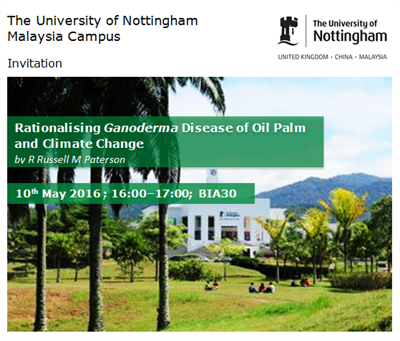
Seminar Invitation
As part of the ongoing celebrations of the School of Biosciences’ 10th anniversary in Malaysia, we are hosting a series of seminars over the coming months. The seminar topics reflect the theme of our anniversary: “nurturing the solutions of tomorrow”. You can find details of our first such seminar below.
Rationalising Ganoderma Disease of Oil Palm and Climate Change
By Dr. R Russell M Paterson
Centre for Biological Engineering, University of Minho, Braga, Portugal
Oil palm is economically important to Malaysia. However, it is subject to Ganoderma boninense disease causing high financial loss, although there remain some serious gaps in knowledge of the disease. G. boninense is a white rot fungus which means it is an efficient lignin degrader, one of the most important polymers within the plant: the type of lignin may be more important than the amount. The other polymers are cellulose, pectin and starch which the fungus can probably use efficiently for energy. When cellulose is degraded by the fungus the oil palm collapses. Lignin is different and requires more energy to degrade than obtained from its utilisation: it protects cellulose which the fungus can utilise. This is why the fungus evolved to degrade lignin. This combination is referred to as lignocellulose. Oil palm also contains glucose and sucrose - readily utilisable by G. boninense. The disease will be considered by comparing readily degraded fractions to those that are difficult. The fungus will utilize (a) glucose, sucrose, starch, free cellulose and pectin and (b) lignocellulose which are (a) degradable and (b) indigestible respectively. My novel hypothesis is that the fungus builds up biomass using the degradable components and then attacks the indigestible leading to plant collapse. The two components can be assayed which will allow us to determine resistant and susceptible oil palm. The palm may have little evolved resistance to G. boninense as it originates from Africa but the fungus is from S E Asia. Finally, climate change will not only affect the disease, but also the ability to grow oil palm per se and I will present models of how suitable climate for oil palm decreases until 2100.
Please RSVP your attendance to Vanitha.Singaram@nottingham.edu.my by 5.00pm Friday, 6th May 2016.
Posted on 4th May 2016